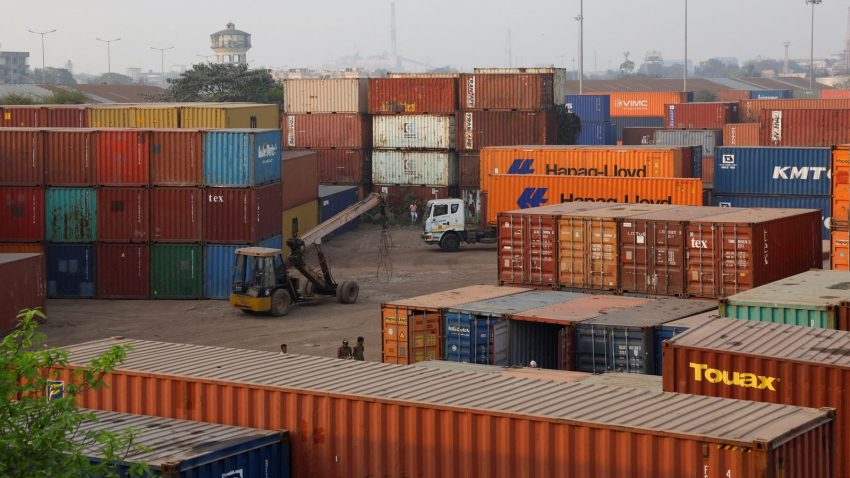India’s Prime Minister Narendra Modi has called his country’s free trade agreement with the UK “historic” and it will “further deepen” the comprehensive strategic partnership between both countries.
The agreement has been in the making since January 2022 and is the culmination of 14 rounds of talks. But we still have to wait for the finer details of the deal.
Sir Keir Starmer hailed the “historic day for the United Kingdom and for India”.
“This is the biggest trade deal that we, the UK, have done since we left the EU,” the prime minister said.
Benefits to India‘s industry were already available, with more than 60% of total Indian merchandise being duty-free into the UK, while the rest attracted low tariffs.
Politics latest: PM urged to rethink two major policies
The average tariff on goods imported from India into the UK is 4.2%, while the average tariff imposed on UK goods into India is 14.6%. In the case of Scotch whisky, it was 150%, with 100% on cars.
When it comes to some of the sticky issues that led to the prolonged negotiations, the picture is less clear. Details of service visas for Indian IT and health workers, business mobility and greater access for its students and professionals in the UK market are still to be deciphered.
However, the deal contains a “double contribution convention”, which means Indian workers coming to Britain and British workers going to India will not have to pay national insurance contributions in both countries for the first three years.
The national insurance exemption was hailed by India as a “huge win” but lambasted by the Conservatives as a giveaway as it makes it cheaper to employ Indians than anybody else in the UK.
Conservative shadow trade minister Harriet Baldwin told the Commons: “This government is literally putting up taxes for British workers but cutting them for Indian workers.”
Just one month ago, UK employers’ national insurance was increased to 15% and the threshold at which employers start paying it was reduced from £9,100 to £5,000, meaning it is now more expensive to employ staff.
What about Scotch whisky?
Though the tariff has been reduced from 150% to 75% on Scotch whisky, has the UK government agreed to making changes in the minimum three-year maturity period to be classified as ‘Scotch’?
Indian whisky manufacturers have lobbied for a reduction to 12-18 months as beyond that, losses due to evaporation – known as ‘angel’s share’ – would make their products unviable.
Thorny issues
The ‘rules of origin’, a provision to help contain the dumping of goods, was another thorny issue. India was adamant that the goods from a third country could not be dumped in its market by just putting a label on it.
Over the years, the Indian government has been very sensitive of data being taken out of the country. It has come down heavily on US tech giants to have servers within the country to which many have had to comply.
The issue of arbitration has been part of the many rounds of talks. India has proposed to first utilise all local judicial remedies for the settlement of disputes before initiating an international arbitration.
The UK wants the ability of its companies to go to international courts directly. The Vodafone lawsuit is still seen as a case of overreach by the Indian government, where the company had to pay millions of dollars in retrospect tax even though it won its arbitration case in a Hong Kong court.
Though automotive tariffs have been reduced from 100% to 10% under a quota, there is little clarity on how much India would allow Britain’s advanced manufacturing sectors and clean energy industry into its growing market.
The protected EV sector in India
India ferociously protects its EV (electric vehicle) sector and encourages its domestic industry through production-linked incentive schemes.
There is also no mention of ‘carbon tax’ which the UK wanted to levy, a concern for India as it could restrict the export of metal products.
India’s labour-intensive sectors like textiles, footwear, gems and jewellery will surely benefit with lower tariffs as it will level the playing field with its competitors in the UK.
The bilateral trade between India and the UK increased to $21.34bn in 2023-24 from $20.36bn in 2022-23.
Both countries seek to double this in the next 10 years.
Free trade agreement talks between India and the UK started on 13 January 2022, and initially progressed fast. But they got stuck over key issues, COVID and general elections in both countries.
India has signed limited agreements with Mauritius, the UAE and Australia, this one being the most comprehensive of them all.
It is actively negotiating a bilateral trade agreement with America, its largest trading partner. President Donald Trump had levied a 26% reciprocal tariff which is currently on hold.





